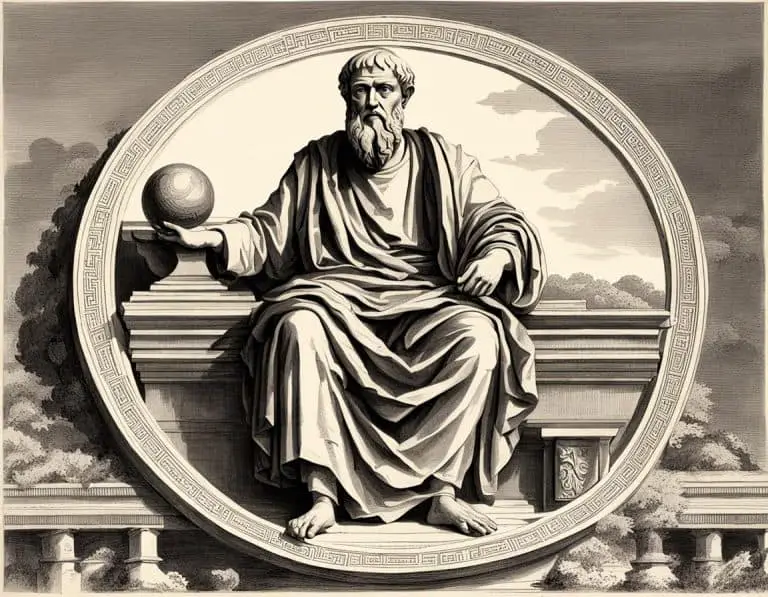Theory of Forms
Plato’s Theory of Forms is a cornerstone of his philosophical framework, providing a foundational understanding of reality and knowledge. The concept posits that beyond the physical world we perceive with our senses lies a realm of perfect, eternal Forms or Ideas. These Forms are the true essence of things, serving as the ultimate reality that the material world merely imitates or shadows. For Plato, the world of Forms represents the unchanging and absolute truth that transcends the imperfections and uncertainties of the visible world.
The Theory of Forms greatly influences Plato’s views on epistemology, metaphysics, and ethics. By emphasizing the existence of a higher, unchanging reality, Plato underscores the importance of seeking knowledge and wisdom to grasp the truth behind the illusions of the material world. This pursuit of intellectual and moral truth becomes a central tenet in Plato’s philosophy, as he believes that individuals must engage in a lifelong process of education and reflection to move closer to understanding the Forms and achieving a just and virtuous life.
Development of Plato’s Theory of Forms and its Influences
Plato’s Theory of Forms stands as one of the most profound and enduring philosophical concepts in history. Rooted in his belief that the physical world is merely a shadow of a higher realm of pure, abstract forms, Plato’s theory fundamentally shapes his entire philosophical framework. Influenced by his mentor Socrates and the Pythagorean belief in the eternal and unchanging nature of reality, Plato developed his Theory of Forms as a means to explain the essence of existence and the nature of knowledge.
The Theory of Forms underwent a profound evolution in Plato’s works, moving from a more concrete and simplistic understanding to a more nuanced and complex concept. Initially centered on concepts of justice, beauty, and goodness as individual abstract forms, Plato later expanded his theory to encompass the idea of the Form of the Good as the ultimate source of all forms and the highest reality. Drawing on the mathematical patterns of the Pythagoreans and the dialectical method of Socrates, Plato’s theory continued to develop and influence his dialogues, shaping his philosophical inquiries into ethics, politics, and metaphysics.
Dialogues
Plato’s dialogues provide a unique glimpse into the development of his philosophical beliefs. Through engaging conversations between various characters, Plato masterfully presents his ideas on justice, virtue, and the nature of reality. These dialogues not only showcase Plato’s critical thinking skills but also highlight his ability to explore complex concepts in a relatable and accessible manner.
By examining how Plato uses his dialogues to present conflicting viewpoints and engage in deep intellectual discussions, we can gain insight into the evolution of his philosophical thought. The dialogues serve as a platform for Plato to challenge conventional wisdom, question societal norms, and ultimately, to lay the foundation for his enduring philosophical legacy. Through the Socratic method of rigorous questioning and debate, Plato invites readers to ponder profound existential questions and contemplate the essence of truth and knowledge.
Examination of How Plato’s Dialogues Shaped His Philosophical Beliefs
Plato’s dialogues, notably “The Republic,” “Phaedo,” and “Symposium,” serve as the cornerstone of his philosophical legacy. These dialogues are not just literary works but also profound philosophical investigations that have a lasting impact on Western thought. Through the vehicle of conversations between Socrates and other characters, Plato explores a wide array of philosophical topics, from ethics and politics to metaphysics and epistemology, thereby shaping his own philosophical beliefs.
In examining Plato’s dialogues, one can discern his philosophical methodology of dialectic, where truth is pursued through dialogue and intellectual inquiry. This method of inquiry involves stripping away superficial beliefs to reveal deeper truths and underlying principles. Additionally, the dialogues often present conflicting viewpoints and engage the reader in critical thinking, challenging them to question their own assumptions and biases. By immersing himself in the dialogical form, Plato not only conveys his philosophical ideas but also fosters a spirit of open-minded inquiry and intellectual curiosity in his readers.
Political Thought
Plato’s political thought is deeply intertwined with his philosophical principles and beliefs. His most famous work, “The Republic,” delves into the concept of an ideal state governed by philosopher-kings. Plato argues that the best form of government is a meritocratic aristocracy where rulers are chosen based on their wisdom and virtue, rather than through birthright or wealth.
Moreover, Plato’s political ideas highlight the importance of justice, harmony, and order within a society. He believed that a just society can only be achieved when there is a harmonious balance between different classes, each fulfilling its designated role. Plato’s utopian vision of a just city-state serves as a reflection of his broader philosophical views on the ideal forms and the pursuit of truth and knowledge.
Connection Between Plato’s Political Ideas and his Philosophical Principles
Plato’s political ideas were intricately interconnected with his philosophical principles. His belief in the ideal state, outlined in works like “The Republic,” reflected his philosophy of the ideal forms. Plato’s concept of philosopher-kings ruling the state was a direct manifestation of his philosophical notion that the most knowledgeable and virtuous individuals should lead society. This intertwining of governance and philosophy emphasized Plato’s conviction that the pursuit of wisdom and truth should guide political actions and decision-making.
Furthermore, Plato’s political thought reflected his philosophical belief in the hierarchical structure of the world. Just as he envisioned a structured society with distinct classes, Plato’s philosophy posited a universe organized according to the hierarchy of forms. This parallelism between his political and philosophical frameworks underscored Plato’s view that order and harmony were essential for both the state and the metaphysical realm. Plato saw governance as an extension of his philosophical inquiries, viewing politics as a means to manifest his ideals of justice, virtue, and the pursuit of knowledge.
Related Links
Why did Plato’s family and upbringing play a crucial role in his philosophical development?
What impact did military service have on Plato’s philosophy?
